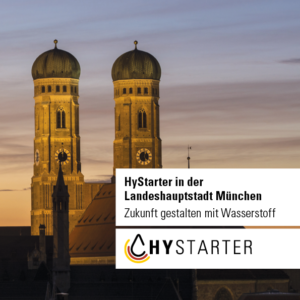HyStarter II: State Capital Munich

The state capital of Munich is one of the most sought-after locations for business and innovation in Europe. The city on the Isar River is characterised by renowned global players, especially in the industrial and high-tech sectors, an innovative SME sector and a creative, broad-based start-up scene. In addition, there are a large number of research institutions, colleges and universities. Together, these create an environment in which new products and services have repeatedly been successfully developed over many years. Innovation, research and science are the essential framework conditions for Munich’s competitiveness and success as a digital location of the future.
In this context, it is important to analyse new and sustainable technologies such as hydrogen and fuel cells and their potential for the state capital of Munich, and to develop a viable concept.
-
Establishment of an active network of stakeholders
-
Supporting synergy effects and knowledge transfer in the region
-
Survey of the status quo with regard to hydrogen and fuel cell technology and the associated decarbonisation potential
-
Analysis and identification of application areas, production and transport paths
-
Evaluation of the necessary adjustments in production, transport infrastructure and facilities on the customer side
-
Networking of electricity, heating and transport in the context of sector coupling
-
Development of a hydrogen strategy with concrete projects and measures
Some 20 stakeholders from science, politics and business from the state capital of Munich as well as the surrounding region.
Rebecca Wippersteg
Department for Climate and Environmental Protection City of Munich hystarter.rku@muenchen.de
+49 89 233 37929
© Munich Tourism, Jörg Lutz


